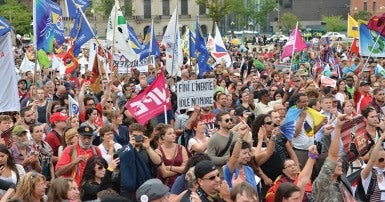A resurgence of grassroots activism is leading the way for greater equality and deeper changes to our economic system. In most cases, women and members of equality-seeking groups outside existing power structures are leading these movements.
The Idle No More (INM) movement was started by three Indigenous women and a non-Indigenous woman in inner-city Saskatoon, in opposition to federal measures that severely weakened laws protecting the environment. INM soon became one of the largest Indigenous mass movements in Canadian history. It is also changing history. Indigenous peoples are asserting their sovereignty and rights, and mobilizing to oppose unrestrained resource development. This movement is inspiring many to support more sustainable and equitable alternatives.
The Fight for $15 campaign has become the largest grassroots workers’ movement in recent years. It developed from the struggles by low-paid non-unionized fast food and retail workers – many of them women and racialized workers. Unions, workers’ action centres and other activists are helping organize and support the workers’ strikes and other actions. In response, major US cities have moved to raise their minimum wage to $15 an hour. The movement has also spread to Canada, backed by many labour organizations. Alberta’s NDP government has pledged to increase its minimum wage to $15, and the Ontario and federal NDP both support a $15 minimum wage.
Three Black women organizing in their community started the Black Lives Matter (BLM) movement to confront racism. BLM activists in many cities – including recently in Toronto – are naming and resisting police brutality, racial profiling, discrimination in the justice system and broader economic and social inequality. BLM’s core message of affirmation builds on the civil rights and Black liberation movements.
While initiated by and identified with the rights of specific groups of people, these movements connect us all. They draw strong support from labour unions and everyone pushing for a more equitable and sustainable society.
Political equality and economic equality are interconnected. The 20th century “rights revolution” was also a time of increasing economic equality and growth, but it’s an unfinished revolution. Movements like INM, BLM and Fight for $15 show what’s possible when people organize and mobilize in their communities in the fight for greater justice and equality for all.



